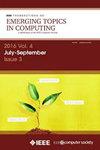0-1多维背包问题的路径积分量子退火优化验证
IF 5.4
2区 计算机科学
Q1 COMPUTER SCIENCE, INFORMATION SYSTEMS
IEEE Transactions on Emerging Topics in Computing
Pub Date : 2025-07-01
DOI:10.1109/TETC.2025.3583224
引用次数: 0
摘要
量子退火(QA)是一种元启发式算法,旨在通过利用量子力学的概念来增强模拟退火,提高经典计算机的并行化。研究表明,该技术在np困难问题和约束优化领域取得了可喜的成果。在本文中,我们研究了路径积分量子退火(PIQA),这是一种在传统计算机上模拟QA的著名技术。然后,我们提出了算法的优化,为硬件软件开发人员提供了一套并行化技术,评估了它们在提高质量和速度方面的有效性。所提出的方法包括四个不同程度的优化,利用基于多试验并行的技术和一种新的预优化方法。本文进一步提出了一种在搜索空间中处理多个实例的方法,通过这种方法,问题数据被复制到片中,并在模拟期间分配给并发进程。通过实证试验,我们以多维背包问题为基准,评估了与未优化的PIQA相比,我们的优化技术对算法收敛速度的影响。我们的研究结果表明,这些优化,单独或集体应用,使算法以更少的模拟步骤获得相同或更好的结果。总的来说,结果突出了未来在专用硬件上实现优化PIQA的潜力。本文章由计算机程序翻译,如有差异,请以英文原文为准。
Path Integral Quantum Annealing Optimizations Validated on 0-1 Multidimensional Knapsack Problem
Quantum Annealing (QA) is a metaheuristic designed to enhance Simulated Annealing by leveraging concepts from quantum mechanics, improving parallelization on classical computers. Studies have shown promising results for this technique in the field of NP-hard problems and constrained optimization. In this article, we examine Path Integral Quantum Annealing (PIQA), a well-known technique for simulating QA on conventional computers. We then propose optimizations to the algorithm, offering hardware software developers a suite of parallelization techniques evaluated for their effectiveness in enhancing quality and speed. The proposed approach encompasses four distinct degrees of optimization, leveraging techniques based on multiple-trial parallelism and a novel pre-optimization method. The article further proposes a methodology for handling multiple instances within the search space, whereby problem data is replicated into slices and allocated to concurrent processes during the simulation. Through empirical trials, we evaluate the impact of our optimization techniques on the convergence speed of the algorithm compared to unoptimized PIQA, using the Multidimensional Knapsack Problem as a benchmark. Our findings show that these optimizations, applied individually or collectively, enable the algorithm to achieve equal or superior results with fewer simulation steps. Overall, the results highlight the potential for future implementations of optimized PIQA on dedicated hardware.
求助全文
通过发布文献求助,成功后即可免费获取论文全文。
去求助
来源期刊

IEEE Transactions on Emerging Topics in Computing
Computer Science-Computer Science (miscellaneous)
CiteScore
12.10
自引率
5.10%
发文量
113
期刊介绍:
IEEE Transactions on Emerging Topics in Computing publishes papers on emerging aspects of computer science, computing technology, and computing applications not currently covered by other IEEE Computer Society Transactions. Some examples of emerging topics in computing include: IT for Green, Synthetic and organic computing structures and systems, Advanced analytics, Social/occupational computing, Location-based/client computer systems, Morphic computer design, Electronic game systems, & Health-care IT.
 求助内容:
求助内容: 应助结果提醒方式:
应助结果提醒方式:


